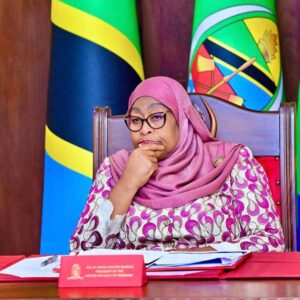NAMANGA, Kenya — Tension rippled across the Kenya–Tanzania border at Namanga on Thursday morning as a group of Kenyan citizens attempted to cross into Tanzania in a rare gesture of regional solidarity. Their goal: to stand with Tanzanian demonstrators protesting alleged election fraud and government repression following the country’s October 29 general elections.
The group, waving Kenyan flags and chanting slogans of unity, gathered near the Namanga Border Post before being dispersed by Kenyan police using tear gas. Authorities cited security concerns and the need to prevent cross-border unrest. Witnesses described a tense standoff, with clouds of tear gas drifting through the bustling border town as police blocked attempts to cross into Tanzanian territory.
The protests in Tanzania erupted shortly after polls closed in an election marred by controversy. Millions had voted to elect a president, parliament, and regional leaders in a contest overshadowed by the disqualification of key opposition candidates, including Tundu Lissu of the Chadema party and Luhaga Mpina of ACT-Wazalendo. Both had been barred by the electoral commission amid disputes over eligibility, drawing condemnation from opposition supporters and civil society groups.
Lissu, a prominent opposition figure who survived an assassination attempt in 2017 and now faces treason charges, had earlier called for electoral reforms and accused President Samia Suluhu Hassan’s administration of orchestrating a “managed democracy.” His party urged voters to boycott what it described as a “coronation” for the incumbent president.
As preliminary results trickled in, showing Hassan in the lead, violent protests broke out in Dar es Salaam and other major cities, including Arusha and Mwanza. Eyewitnesses reported police firing live rounds and tear gas to disperse crowds demanding transparency. Human rights monitors said at least two people were killed in the initial clashes, though official confirmation was still pending.
The situation escalated when protesters stormed sections of Julius Nyerere International Airport, attempting to block officials from leaving the country, and gathered outside military barracks urging soldiers to “stand with the people.” In response, the Tanzanian government imposed a dusk-to-dawn curfew in Dar es Salaam, suspended internet access nationwide—an outage confirmed by the digital rights group NetBlocks—and ordered civil servants and students to work from home.
Back at Namanga, Kenyan authorities appeared wary of being drawn into the turmoil. Kenya’s National Police Service maintained a visible presence at the border, warning that cross-border political demonstrations could violate security protocols under the East African Community framework.
Despite the dispersal, many Kenyans took to social media to express support for Tanzanians demanding electoral accountability. This reflects a broader frustration with governance challenges in several East African states.
By mid-afternoon, reports indicated that unrest in Tanzania was spreading, with government offices torched in parts of Arusha and Mbeya. The Tanzanian National Electoral Commission, meanwhile, had yet to announce final results, urging calm amid growing pressure from international observers and regional bodies to ensure transparency.
The events at Namanga and across Tanzania highlight the deepening political interconnection in East Africa—where citizens increasingly view democratic struggles not as national issues, but as shared regional battles for justice and accountability.





